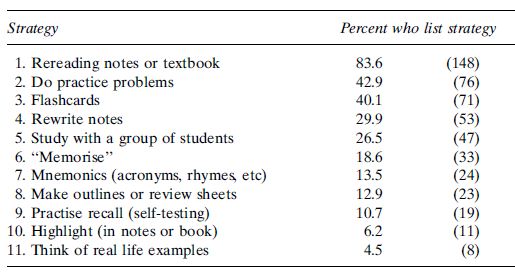Like students at those schools, my students tend to take notes in class, color the readings with a highlighter, and later reread the notes and the highlighted bits of the text.
This Table show the results of a study by Jeff Karpicke and his colleagues (2009) on the study strategies of students at Washington University in St. Louis. (For other studies leading to similar conclusions see Hartwig & Dunlosky, 2012; Kornell & Bjork, 2007).
The table shows that students rarely self-test as a learning strategy. Other data show that they more often self-test as a check to be sure that they have studied enough.
There is much discussion these days of how much time students ought to spend studying text for later tests of factual recall. Whatever your answer to this question, if students are going to do it, we might as well give them the tools to do a good job.
This article on the website of the American Psychological Association is a good start.
Hartwig, M. K. & Dunlosky, J. (2012). Study strategies of college students: Are self-testing and scheduling related to achievement? Psychonomic Bulletin & Review, 19, 126-134.
Karpicke, J. D. & Blunt, J. R. (2011). Retrieval practice produces more learning than elaborative studying with concept mapping. Science, 331, 772-775.
Karpicke, J. D., Butler, A. C., & Roediger, H. L., III. (2009). Metacognitive strategies in student learning: Do students practice retrieval when they study on their own? Memory, 17, 471–479.
Kornell, N., & Bjork, R. A. (2007). The promise and perils of self regulated study. Psychonomic Bulletin & Review, 14, 219–224.

 RSS Feed
RSS Feed